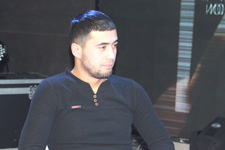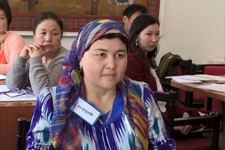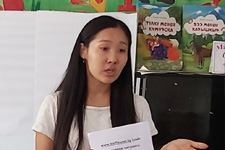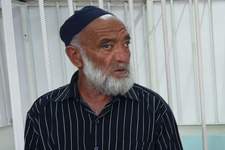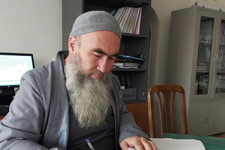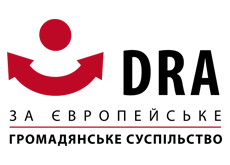The right to peaceful assembly in the Kyrgyz Republic.
The report on the monitoring of peaceful assembly was prepared by the “Human rights movement: Bir Duino Kyrgyzstan" (hereinafter Bir Duino) within the framework of the project “Reinforcing Human Rights in Kyrgyzstan through Strengthening and Expansion of the Political Space” supported by the Freedom House Kyrgyzstan.
Legal experts have conducted the analysis of the legislation and normative basis of the Kyrgyz Republic on peaceful assembly in addition to a study on the trends of development of civil society. Furthermore, monitoring specialists were involved to observe and analyze the situation with the implementation of the rights to peaceful assembly in each oblast.
The legal framework regulating the conduct of peaceful assembly and its compliance with basic international standards and requirements[1].
Guidelines on Freedom of Peaceful Assembly published by the OSCE legally adopted for regulation of freedom of assembly[2].
The basic normative and legal acts regulating the right of citizens to freedom of peaceful assembly are the international legal instruments: The Universal Declaration of Human Rights (1948), The Covenant on Civil and Political Rights (1966), The European Convention for the Protection of Human Rights and Fundamental freedoms (1950).
At the national level the main legal basis for freedom of assembly have been reflected in the Constitution of the Kyrgyz Republic. Notification of authorities about planned assembly is the right of the organizers and participants of peaceful assembly. In accordance with the law, prohibition and restriction of the peaceful assembly is not allowed.
Positive tendencies
International legal norms as well as generally accepted principles on the right to freedom of peaceful assembly are fully consolidated in the Constitution and the Law on Peaceful Assemblies[3]. An important innovation in this law is that notification of the authorities about the upcoming assemblies is prescribed as the right and not as the obligation as it was in earlier versions of the law. According to the previous law, organizers should have provided a compulsory notification to get the permission for peaceful assembly[4]. Another important requirement of the law is the peaceful nature of assemblies. There is a basis for the prohibition or restriction of peaceful assemblies by the decision of courts.
Negative tendencies
The amendments to the Code of administrative responsibility of the Kyrgyz Republic and the Criminal Code implies administrative and criminal liability in case of street blocking. Moreover, a draft law to ban peaceful demonstrations organized with the support of foreign funds was initiated. More details about this are set out below:
- New amendments[5] to the Code of Administrative Responsibility of the Kyrgyz Republic were added in 2013 providing for administrative liability (article 231-1) for illegal blocking of streets, i.e. actions restricting the rights and freedoms of citizens on the free movement of individuals and (or) legal entities. Thus, if participants of peaceful assembly during the demonstrations and meetings will use streets, roads and other places causing restriction on free movement and blockage those actions will automatically fall under the same article;
- In 2013 the Ministry of Internal Affairs of the Kyrgyz Republic attempted to amend the Law on Peaceful Assemblies and eliminate the item on prohibition on the use of force by police during the peaceful assembly[6];
- In 2014 in the Criminal Code of the Kyrgyz Republic a new article #287-1[7] implies criminal liability for the illegal blocking of streets. According to the provision, illegal street blocking is deliberate actions causing blocking or restricting the movement of pedestrians, cars and other means of transport lasting more than 24 hours. Actions of blocking of the streets caused by participants or specially installed barriers, equipment or other items or prevention of the clearing of the streets from the crowds or barriers, equipment or other items falls under introduced amendments;
- In 2014 article #329 were amended in the Code of Administrative Responsibility of the Kyrgyz Republic. New amendment proposes violation of the legal order of peaceful assembly committed by the concealment of the face by using masks, bandages or other items for closing the face. However, the Law on Peaceful assembly does not contain provisions on the prohibition of peaceful assembly with the concealment of the face by using masks and bandages. Paragraph 98 of the explanatory note to the Guidelines states that wearing of masks is not prohibited if it implies the expression of the message or content of the demonstration and as long as the mask does not create a clear danger of imminent unlawful conduct or not only used to prevent from the identification of the person’s identity whose behavior creates a probable cause for the arrest. Accordingly, in the current edition this norm does not correspond to democratic standards regulating peaceful assembly. This norm should be stated in a way that the prohibition on wearing masks implies only in the cases mentioned above[8];
- In 2015 the draft law on amendments to the law on peaceful assemblies and to the Code of administrative responsibility[9] was initiated by the Ministry of Internal Affairs of the Kyrgyz Republic. The draft law proposes an article that regulates the financial and logistical support to the peaceful assembly. According to the amendment the state bodies and local authorities shall be informed in writing about the participants carrying out the financial and logistical support to peaceful assembly; Financial and logistical support to peaceful assembly by foreign states, foreign legal entities and individuals is prohibited. In addition, participants and organizers of the assembly are not allowed to receive support from above mentioned entities. Financial and logistical support of the peaceful assembly by a foreign state, by foreign legal entities and by individuals is the basis for prohibiting of the meeting and demonstration. In this case organizers and participants of peaceful assembly are subject to administrative liability for the violation of this prohibition[10].
- Peaceful assemblies are banned on the Central Ala-Too Square and in front of the Government House until 15 September. The ban is valid according to the decision of the Pervomaisky district court dated July 7. According to the court decision to ban on holding of meetings, rallies and protests was initiated by the Pervomayskiy district administration. The head of Pervomaisky district Kanatbek Aydarov points out that the restrictions do not interfere with the right of protesters because there are other places where protests can be held. Current restrictions are due to the national events: Independence Day, World Nomad Games and CIS Summit to be held on August 31, from 3 to 8 September and from 16 to 17 September 2016 respectively.
The above mentioned provisions contribute to the restriction of the right to freedom of peaceful assembly under penalty of liability (criminal or administrative). In addition, entities wishing to organize a peaceful assembly are considered "outside the law". This in turn might cause the conflict.
Implementation of the right to peaceful assembly
The results of the opinion poll of the leaders of local NGOs conducted by the “Human rights movement: Bir Duino-Kyrgyzstan" showed that 7 out of 52 companies (13.5% of the respondents) have experienced barriers by government or local authorities in organizing peaceful assemblies, meetings, promotions, flash mobs for the last five years.
Number of opened, initiated or considered criminal cases during the organization of peaceful assembly from 2012 to 2015 in Kyrgyzstan
According to the data requested from the state bodies of the Kyrgyz Republic (the Supreme Court, the Judicial Department, Prosecutor General's Office, Head Department of Public Security under Ministry of Interior Affairs, Mayor's office) following results were obtained:
|
|
2012 |
2013 |
2014 |
2015 |
|
Number of opened criminal cases during the organization of peaceful assembly according to Prosecutor’s General Office |
3 |
8 |
5 |
0 |
|
Number of retained people according to Prosecutor’s General Office |
7 |
10 |
4 |
0 |
|
Number of investigated criminal cases during the organization of peaceful assembly according to General Directorate of Public Security |
1 |
3 |
4 |
0 |
|
The number of cases received under Article 148 "Obstructing the exercise of the right to freedom of peaceful assembly¨ according to the Judicial Department at the Supreme Court |
1 |
0 |
1 |
0 |
According to data presented in the table in the period from 2012 to 2015 the growth in the number of arrests of persons and opening of criminal cases for restricting the right to freedom of peaceful assembly during demonstrations was not observed. In this case it can be assumed that the peaceful assemblies were organized and held properly or not all violations could be identified. This also implies that the majority of prosecutions are not brought to court or are closed after investigation.
According to the requested data from the Mayor's office in the period from 2012 to December 2015, overall 338 notification letters on organization peaceful assemblies were sent to the Mayor’s Office. In total, one meeting was postponed and four were canceled. Mayor’s Office have not provided any information related to the reasons for rescheduling or banning of peaceful assembly. According to the data it is not known whether the ban for organization of peaceful assembly were issued by the court decision. It should be noted that in connection with the adoption of the Law on peaceful assemblies the decision to change the duration of the meeting, the venue or the route should be taken by the court decision.
Number of notification letters on organization of peaceful assemblies and meetings send to Mayor’s Office of Bishkek city:
|
|
2012 |
2013 |
2014 |
2015 |
|
From citizens |
45 |
44 |
39 |
83 |
|
From government organizations |
|
|
1 |
1 |
|
From commercial organization |
4 |
2 |
0 |
1 |
|
From labor unions |
1 |
1 |
2 |
0 |
|
From political parties |
2 |
4 |
2 |
41 |
|
From non-commercial organizations |
19 |
22 |
18 |
6 |
According to the data provided by Mayor's Office, labor unions conduct at least one peaceful assembly annually. There has been an increase in the number of peaceful assemblies held by citizens’ initiative, at the same time the number of meetings held by NGOs has significantly reduced. There has been a sharp increase in the number of meetings held by political parties in 2015. This, probably is due to the Parliamentary Elections. The number of meetings in other years is very small due to weak activity of political parties in the period between elections.
Official statistical data on peaceful assemblies from September 2015 to August 2016
"Human rights movement: Bir Duino - Kyrgyzstan" has requested this data from the Ministry of Internal Affairs. As a result, according to the Head Department of the Ministry of Internal Affairs dated 15/09/2016 from September 2015 to August 2016 -in Kyrgyzstan 580 meetings have been registered.
|
Town/Oblast |
Number of peaceful assemblies |
Political |
Social/Economic/Civil |
|
279 |
84 |
195 |
|
61 |
4 |
57 |
|
21 |
2 |
19 |
|
32 |
2 |
30 |
|
40 |
2 |
38 |
|
80 |
14 |
66 |
|
30 |
3 |
27 |
|
16 |
2 |
3 |
|
21 |
1 |
20 |
|
TOTAL |
580 |
114 |
466 |
According to the data provided by the Ministry of Internal Affairs banning of meetings organized in front of the buildings of state institutions in particular, in front of the Jogorku Kenesh of the Kyrgyz Republic and the Government House was imposed by the Pervomaisky district court of Bishkek. In many cases the assemblies were carried out in Bishkek and in regions of the country without filing notification to state authorities.
Appeal against the decision of the Pervomaisky district court on the restriction of peaceful assemblies
On 12 April 2016 the "Human rights movement: Bir Duino - Kyrgyzstan" and a number of other public organizations and civil activists held a peaceful assembly against discriminatory amendments to the Law on noncommercial organizations being considered by the Jogorku Kenesh Committee on Constitutional Legislation, State Structure, Judicial and Legal Issues and Regulations (hereinafter the Committee of Jogorku Kenesh).
The meeting was peaceful members of the police department of Pervomaisky district who were present during the event had no objections and did not interrupt the assembly. On 14 April 2016 of the Jogorku Kenesh of the Kyrgyz approved the amendments to the Law on noncommercial organizations on the second reading in spite of violations of all procedures stipulated by the regulations of the Jogorku Kenesh. In this regard, Bir Duino conducted another peaceful assembly demanding for rejection of discriminatory amendments during the third reading which was scheduled on 21 April 2016.
However, on 18 April 2016 representatives of Internal Affairs Department of Pervomaisky district informed that any kind of meetings and demonstrations in front the building of the Jogorku Kenesh are banned from April 13 to April 23 based on the decision of the Pervomaisky district court. Moreover, representatives of Internal Affairs Department did not provide organizers of the meeting with the official document and court’s decision. The police department of Pervomaisky district refused to grant the official decision, but allowed to make a copy of the document.
Thus, the decision of the Pervomaisky district court dated on April 12 2016 (by the judge A. Kalybaiev) on the restriction of any kind of meetings and demonstrations in front the building of the Jogorku Kenesh, House of Government, on Ala-too Square and on the square on Frunze Street among Erkindik boulevard, Chui avenue and Tynystanova street are banned from April 13 to April 23. All assemblies and demonstrations should be organized in Gorky park on Isanova street.
This decision is illegal and subject to cancellation based on the following reasons:
In accordance with Part 2 of Article 14 and Part 1 of Article 15 of the Law on peaceful assembly territorial divisions of internal affairs department may decide to limit the time, venue or route of the assembly only in respect of the meeting held in the case, when there is a real threat to the security of the participants and other citizens.
The decision of the Internal Affairs Department of Pervomaisky district dated on April 12 regarding the restriction of any kind of meetings and demonstrations in front the building of the Jogorku Kenesh of the Kyrgyz Republic contradicts to the above regulations and cannot be implemented to the mentioned event.
The decision of Pervomaisky district court decision was appealed by the Bir Duino in Bishkek city court, which upheld the decision of the Pervomaisky district court in force. Next, Bir Duino sent a supervisory appeal to the Supreme Court regarding the decision of the Pervomaisky district court and the decision of the Bishkek city court. The Supreme Court rejected the appeal.
Restrictions on the right to peaceful assembly in Bishkek.
However, the prohibition of peaceful assembly in the central Ala-Too Square and in front of the Government House had a negative impact on the ability of citizens to exercise their rights. Two protest meetings were held in front of the Jogorku Kenesh building in September: Members of the Kyrgyz Association of the Blind and the Deaf People and citizens protesting against the confiscation of private property.
According to the citizens protesting against the confiscation of private property the Ministry of Justice of the Kyrgyz Republic has developed amendments to the law that allow the forced removal of private property and land for public needs. Several people came out to protest and have prepared a petition to the deputies of the Jogorku Kenesh. "We demand the immediate and unconditional protection of the fundamental human rights guaranteed by the Constitution - private property and decent housing. We urge you to withdraw the amendments to the law and introduce a moratorium on any changes to the Civil Code and Land Code[11]”.
Human rights defenders of the "Our right" foundation working on solving of housing problems were going to organize a meeting in front of the Parliament building on 1 September to protest against the amendments to the Land and Housing Codes. The representative of the foundation Svetlana Antropova said to Kloop.kg that they will conduct the assembly despite the ban, because the freedom of peaceful assembly is the constitutional right of citizens. “We were not warned of any prohibitions, so we are going to meet on September 1 at 8:30 in front of the Parliament building. It is our constitutional right and peaceful demonstrations are not prohibited by law - she said”.
Next, the ban for organization of assembly became known on the protest of teachers of the National University in front of the building of the Ministry of Education. Officer of the 10th Department of the Ministry of Interior Affairs warned the participants of the meeting that they cannot organize an assembly on the Ala Too Square according to the decision of the court[12].
On July 26, 700 people gathered at Gorky park to the meeting aimed at protecting the rights for housing. The protesters intended to go to the streets and block the roads. The police officers informed the participants regarding the ban to enter the main square and to block the road and detained a number of protesters and the organizer of the meeting, Nurlan Asanov for disobedience to police.
According to the decision of the Pervomaisky district court participants of the meeting were punished. Five people were imposed an administrative arrest (in detention center), two of them - for 4 days (one of them is N.Asanov), three - for 3 days. And 28 citizens were imposed an administrative fine, 5 people - 500 KGS; and the rest 23 people - 300 KGS. Two people needed medical assistance. With two held a preventive conversation were held with two participants[13].
Other assemblies and meetings. Despite the ban to gather at Ala-Too Square some groups could hold meetings there. They are: The Kyrgyz Society of the Deaf and the Blind People; a rally regarding the land issues; monthly meetings organized by Bir Duino in defense of women's rights; the protection of citizens' rights for freedom of association; meeting to protect the honor and dignity of human rights defenders T.Ismailova A.Abdirasulova.
People's Parliament. On May 12, 2016 members of People's Parliament organized a forum. The union includes former officials and opposition leaders, including former Minister of Interior Affairs Omurbek Suvanaliev, former Government Secretary Adahan Madumarov. The leader of the movement is the former governor of Jalal-Abad region (southern Kyrgyzstan) Bekbolot Talgarbekov. On May 7 People's Parliament hold a meeting in the center of Bishkek demanding the resignation of the President of Kyrgyzstan Almazbek Atambayev.
As a result, on 12 May Government Committee for National Security has opened a criminal case against the union leaders of the People's Parliament Bekbolot Talgarbekov, Torobay Kolubaev and Marat Sultanov on the grounds of crime under the articles 27-295 - Preparation for the violent seizure of power and Article 27-341 - Preparation for use violence against government representative according to the Criminal Code of the Kyrgyz Republic.
On September 8, 2016 the relatives of imprisoned members (about 50 people) of the opposition movement People's Parliament gathered in front of the building of the Pervomaisky district court. At that day a closed trial over the detained members of the movement were held. Relatives and supporters of imprisoned protesters demanded to conduct public hearings and render an objective verdict.
On September 15, 2016 the court continued to hear the case against opposition politicians accused of trying to seize power. The trial was closed. More than 50 people held a rally in front of the court, with the requirement of open and fair court investigation.
The nature of peaceful assembly in the regions of Kyrgyzstan.
In Batken oblast from September 2015 to 17 August 2016, according to observers 22 rallies and protests were held. From September to December 2015 about 6 meetings were recorded; from January to August over 16 peaceful demonstrations and rallies. Almost all of the meetings did not pursue any political objectives and mainly were related to personal grievances and border issues. The exception is the meeting which took place on July 2016 where participants demanded to prosecute the police officers involved in the torture of Nurgazy Sarytaev. As a result, the regional prosecutor's office has dismissed three police officers on suspicion of torture and opened an investigation. Local authorities provided material assistance to the affected.
Osh oblast. During the reporting period, the observer noted 10 peaceful assemblies. The most significant was the case in the area of the mosque Al-Sarahisy in Kara-Suu, where residents had planned a celebration of the end of Orozo on July 6, however, the government banned and demanded that the celebration should take place on 5 July according to the order. On the morning of July 6, the believers found that the was mosque closed and surrounded by the law enforcement officials. Nearby, there was a bus with soldiers. Thus, the rights of citizens to freedom of religion and freedom of assembly were restricted. Representatives of Bir Duino suggested to fight for their rights, but they were afraid to continue to assert their rights for fear of persecution and accusations included in the 299th article of the Criminal Code (storage and distribution of extremist materials).
Demonstrations demanding the release of the leaders are a convenient tool to influence political situation, but recently they are decreasing. For example, in Osh in the last three months no such kind of meetings were held. There was a brief and peaceful rally in Uzgen demanding the speedy release of the political prisoner as an attempt to influence the judiciary.
Positive events associated with cultural themes: events, flash mobs, meetings. They were held under prior authorization by the local government representatives, with the involvement of the media, NGOs, business structures.
In Jalalabad observer recorded 11 meetings with political aspect. In September and October 2015, an increasing number of meetings was due to the local elections. There was a case when the party Respublika-Ata-Jurt were not allowed to hold a peaceful meeting by the local authorities. In January, in the Bazar-Korgon district of the village Arstanbap residents came to the rally because of illegal search of houses and accusations on being members of Hizb ut-Tazrir.
In May 2016 meetings were held one in connection with the transfer of the house of Kadyrjan Batyrov to Bakiyev's family and the other on confiscation of property of human rights activist Azimzhan Askarov in favor of the state.
In June, Jalal-Abad City Hall began to destroy houses of people to build the roads and angry people came to organize a protest meeting. Residents of Jalal-Abad, citing the illegality of the destruction of private property without permits sought help from local human rights defenders. In order to obtain reliable information G. Mamasalieva, representative of Interbilim Osh oblast, met with the residents, but Mayor Salaydin Avazov did not give the opportunity to conduct the discussions and demanded Mamasalieva to leave the city.
In Talas oblast 13 peaceful assembly were noted, mainly dealing with socio-economic issues and interests of citizens. The largest number of meetings (8 meetings recorded), focused on decreasing of beans prices and other agricultural products. As a result, the issue was raised at the level of the Jogorku Kenesh. It was decided to set minimum prices for agricultural products. Next, protests by local borrowers were also recorded. The appreciation of the US dollar lead to increasing of the cost of electricity, reducing social benefits. Peaceful rallies and meetings were not confined by law enforcement authorities.
In Chui oblast, the monitoring covered the Kemin district. In total, 6 meetings were held. Most of which were directed against the work of the gold mining company LLC "Altyn-Ken". Local authorities tried to react quickly to the planned peaceful assemblies, but then refused to solving the mentioned problems. Also, the meeting dealt with the lack of drinking water and improper distribution of social assistance.
In Naryn oblast, observers reported 14 meetings - mainly to protect socio-economic rights of the inhabitants of the area. Meetings related with the social issues – 10; related to environmental issues – 2; dissatisfaction with the work of local authorities -1; on religion - 1. Any restrictions of rights to peaceful assembly were not observed. Meeting participants focused on the increase in the cost of electricity tariffs, the cost of patents and insurance policies for individual entrepreneurs, the abolition of benefits for doctors working in the highlands, the reduction of subsidies to 10% of the highlands for civil servants, to protect the rights of borrowers on bank loans.
In Issyk-Kul oblast about 10 meetings and gatherings were held. In general, peaceful demonstrations were held in connection with the dissatisfaction of the residents about the work of local authorities; in connection with the environmental problems due to gold mining company Kumtor; failure to provide equal opportunities for campaigning and advertising companies in the local elections. Also, the observer had noted the fact of restricting the right to peaceful assembly of a resident of Karakol, mother-heroine G. Usenova in front of the building of Regional State Administration of Issyk-Kul oblast. She was protesting against eviction from her property.
In the fall 2015 a positive trend has been noted during the election campaign to the parliament. In October 2015 any restrictions or prohibitions on the part of authorities to peaceful assembly by political parties was not observed.Conclusion:
There is a growing number of cases of restriction and termination of peaceful assemblies, which are characterized as unjustified interference when meetings are limited due to the absence of notification or are accompanied by illegal detention and obstruction of peaceful assembly. At the same time human rights activists are concerned that the courts do not check the reasons cited by the police and local government bodies whether they are legitimate and justified while considering the question of the restriction or prohibition of the meeting,
Increasing the number of cases where the authorities do not respond to the demands of participants of peaceful assemblies;
Observed tendency when authorities restrict one groups of people and give permission to other. This selective and discriminatory nature of authorities depends on the nature of the rally, like political topics, or in relation to certain issues of political subjects raised during the peaceful assembly.
Observed facts of interference and obstruction of the activities of associations, holding their meetings by aggressive people, young people, of any social and political movements. Such interventions have been observed in recent years in relation to the LGBT communities and their organizations, and religious communities, in particular, the religious center of Jehovah 's Witnesses.
Recommendations:
To Jogorku Kenesh and the Government of Kyrgyz Republic
- To ensure strict compliance with the Law on peaceful assemblies by law enforcement authorities as well as local authorities.
- Revise the adoption of Article 231-1 of the Code of Administrative Responsibility of the Kyrgyz Republic that implies administrative and criminal liability in case of street blocking. And to revise the Article 392 that implies administrative responsibility for violation of the legal order of peaceful assembly committed by the concealment of the face by using masks, bandages or other items for closing the face to ensure the legislation with international standards guaranteeing the right to freedom of peaceful assembly.
- To revise the legislation regulating the use of sound-amplifying equipment, installation of yurts, horses during the peaceful assemblies. Law enforcement officials use above mentioned reasons as limiting factors in conducting peaceful assemblies as there is a lack of regulation of those issues. However, a presumption in favor of holding assemblies set out in the Guiding Principles on Freedom of assemblies of the ODIHR / OSCE should be taken into consideration. In particular, that everything that is not prohibited by the law in explicit form, should be considered authorized.
- To stop promotion of draft laws aimed at restricting the rights to freedom of peaceful assembly. That is the draft law to ban peaceful assemblies that are financially and logistically supported by foreign states, foreign legal entities and individuals.
- To initiate a training component together with the OSCE / ODIHR experts and the OSCE Academy on the use of guidelines for the implementation of the right of freedom of assembly by law enforcement and other authorities, local government bodies, the Kyrgyz courts and other stakeholders.
To Courts of Kyrgyz Republic:
- To ensure a thorough examination of the applications from the local authorities and their proposed reasons to restrict and ban peaceful assembly. To check for validity those kind of applications for restrictions.
- To cancel the restriction of peaceful assemblies in front of the buildings of public authorities. This leads to the restriction of peaceful assembly in Kyrgyzstan.
[1] The right to freedom of association: the latest trends and prospects for the development of civil society. Report on the results of the study by “Human rights movement: Bir Duino - Kyrgyzstan", Bishkek 2016.
[2] The guidelines set out the minimum standards that must be the basis for laws and practices. It includes substantive and procedural analysis of the right to freedom of assembly and principles that participant states must ensure the implementation of the right.
[3] The report on the right to freedom of peaceful assembly and its implementation in the Kyrgyz Republic based on the monitoring results PF "Kylym Shamy" and the PU "Youth Human Rights Group" Bishkek - 2014.
[4] Narrowing of the political space for civil society in Kyrgyzstan: Trends and Prospects, report by E.Iriskulbekov, expert , "Human rights movement: Bir Duino - Kyrgyzstan".
[5] As amended by the Law of the Kyrgyz Republic from October 25, 2014 №148.
[6] Based on the round table on Freedom of association, of assembly, speech and expression in Kyrgyzstan: Challenges and Prospects organized by "Bir Duino - Kyrgyzstan", December 8, 2015.
[7] As amended by the Law of the Kyrgyz Republic from October 25, 2014 №148.
[8] According to ICNL.
[9] Web site of the Jogorku Kenesh –
http://www.kenesh.kg/lawprojects/lps.aspx?view=projectinfo&id=245183
[10] Based on the round table on Freedom of association, of assembly, speech and expression in Kyrgyzstan: Challenges and Prospects organized by "Bir Duino - Kyrgyzstan", December 8, 2015.
[12] http://kloop.kg/blog/2016/08/26/vlasti-zapretili-mitingi-v-tsentre-bishkeka-do-zaversheniya-sammita-sng/




